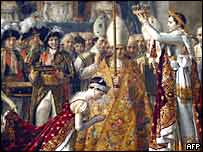|
|
|
Napoleon still haunts France BBC The most famous Frenchman in history is being remembered in France,
with the 200th anniversary of the coronation of the Emperor Napoleon
Bonaparte. Several exhibitions devoted to his memory have opened around Paris: at the Louvre, the Jacquemart museum and at Les Invalides, where he is buried. Yet there are no official celebrations because, even two centuries on, few in France know how to treat his legacy. Should he be remembered as a military genius and great French leader who laid the foundations of modern Europe? Or was he a tyrant and mass murderer, who killed millions during his campaigns of conquest? Europe transformed Perversely, it seems his old enemies the English are more inclined to celebrate him, as are his descendants. They include a Corsican socialist politician, Charles Napoleon, who is keen that his ancestor be remembered as the man who helped create today's Europe. "He's part of my family but I try to make a distinction between family life, history and the political life," he says. Prince Charles Napoleon is the great-great-great-great-nephew of the Emperor, though as a republican he prefers not to use his title. Rather taller than his ancestor, he also has some unexpected views on Napoleon's legacy. "I think he was a very great man for his time, and he was definitely a friend of the English people," he says. "He was against the English government of the day and its policy in Europe, so in that way, England was his first enemy. "But at the same time he was a great fan of the English civil institutions and he was a big admirer of the British institution of the constitutional monarchy."
He was such an admirer that, on 2 December 1804, he decided to crown himself Emperor in front of a crowd of thousands of guests from across Europe, including Pope Pious VII, who came all the way from Rome. But it was that move to make himself Emperor that turned Napoleon from hero to tyrant for many of his admirers across Europe. For Beethoven, Wordsworth and Coleridge, Napoleon went that day from Romantic revolutionary to power-crazed French dictator. Even now people still argue fiercely about which he really was, says Peter Hicks, the British historian who heads the Napoleon Foundation in Paris. There's enough genius to go around, we don't have to talk him up Peter Hicks, Napoleon Foundation "There are so many different ways of looking at Napoleon," he says. "People have different axes to grind, and Napoleon himself expressed himself in so many different ways and that's part of the fascination. "Napoleon himself tried at the end of his life to present himself as a liberal emperor and he wasn't. "Then there are those who say he was a mass murderer, or an uebermensch, and he wasn't that either. But in a way there's enough genius to go around, we don't have to talk him up." Visitors to the Jacquemart museum in Paris can now make up their own minds, at the first ever public exhibition of Napoleon's personal treasures, on loan from the Napoleon Foundation. English lessons Everything is here, from his ornate gold cutlery to readings of his letters to Josephine. Even Napoleon's English homework is on display, complete with misspellings and doodles as the exiled Emperor tried to learn the language of his captors on the island of St Helena, so he could read the English newspapers. "I have ever loved you," reads one line. Another - a typically Napoleonic touch - says "my book is bigger than his". So what do visitors to the exhibition make of him? "He was terrible. He was so in love with himself as an emperor wearing his crown that he forgot what life was like for normal people across Europe, and he kept killing them," says one less-than-impressed tourist as she peers at Napoleon's death mask. "I think he did great things for France, but he was a tyrant too, so I'm ambivalent," believes another young Frenchwoman, who is nonetheless captivated by the delicacy of Josephine's Sevres coffee set. Leaving the emperor's grand tomb at Les Invalides, Charles Napoleon is undismayed. He says whatever his ancestor's weak points, Napoleon I did much good - not just for France but for the whole of Europe. Institutional legacy "He is well known all over the world for his military campaigns but after two centuries, his most important legacy is the civil institutions he built in France and all over Europe," he says. "Because where Napoleon's armies went, behind them came the civil institutions, so a large part of Europe's institutions today are actually French, dating back to the Napoleonic government - and it's based on these institutions that we are going to create Europe now." Some might disagree, but 200 years on, Napoleon's descendant is having his own - rather more peaceful - say in the future of Europe. Rather than mustering a French army, he has been voting in the French Socialist referendum on the European Constitution. He is not sure what his ancestor would have to say about using the ballot box rather than the musket, but he hopes he would have approved. |
